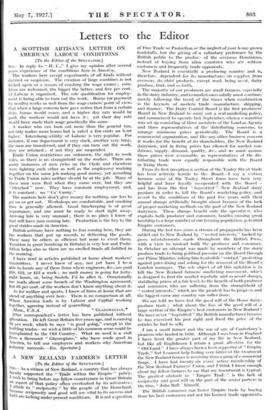Letters to the Editor
A SCOTTISH ARTISAN'S LETTER ON AMERICAN LABOUR CONDITIONS
[To the Editor of the 'SPECTATOR.] • Sra,--In reply to " H. C.," I give my opinion after several years experience of the conditions here in America.
The workers here accept experiments of all kinds without distrust or suspicion. The. creation of large combines is not looked upon as a means of crushing the wage earner ; com- bines are welcomed, the bigger the better, and five per cent. of Labour is organized. The sole qualification for employ- ment is being able to turn out the work. Bonus (or payment by results) works so well from the wage earners' point of view, that when a large concern here gave notice that from a certain date, bonus would cease, and a higher day rate would be paid, the workers would not have it ; yet their day rate would have made their wage practically the. same.
A worker who can turn out more than the general run, not only makes more bonus but is rated a few cents an hour higher. Interchangeability of Labour is very popular. For instance, if one department is very slack, another very busy, the men are transferred, and if they can turn out the work, they are retained ; if not they are suspended.
Trade Union restrictions are unknown, the right to work rules, so there is no stranglehold on the worker. There are many instances of men (who on the Clyde and elsewhere were fighting each other as well as the employers) working together on the same job making good money, yet according to Trade Union rules neither should be at the job. Many of these men were Red when they came over, but they arc
bleached " now. They have constant employment, and, it is constant ; no " Ca' Canny."
The masters here don't give money for nothing, one has to get on or get out. Workshops are comfortable, and smoking time is generally allowed. Good timekeeping is of great importance, and one must be ready to start right away. Arriving late is very unusual ; there is no place I know of that will have men coming late. Production is the key to the great strides made in America.
British artisans have nothing to fear coming here, they are the workers that put up records in delivering the goods. 'there may be others as efficient but none to excel them. Taxation (a great handicap in Britain) is very low and Prohi- bition helps also as there are no swelled heads all fuddled in the morning.
I have read in articles published at home about workers' committees. I never knew of any, nor yet have I been able to locate any of these firms where engineers, &c., are paid £10, £12, or £15 a week ; no such money is going for forty- eight hours, or, being Scotch, I'd be after it. Occasionally One reads about some breach of the Washington agreement, but 95 per cent. of the workers don't know anything about it.
As for welfare and sports, I know of firms at home that are ahead of anything over here. There is no comparison at all. Where America leads is by Labour and Capital working together, agreeing instead of quarrelling.
[Our correspondent's letter has been published without llteration. He left Great Britain five years ago, and is earning £8 per week, which he says " is good going," except in the building trades—we wish a little of his common sense could be transplanted to the Old Country. What we need is a visit from a thousand " Glaswegians," who have made good in America, to tell our employers and workers why American industry succeeds.—En. Spectator.]














































 Previous page
Previous page